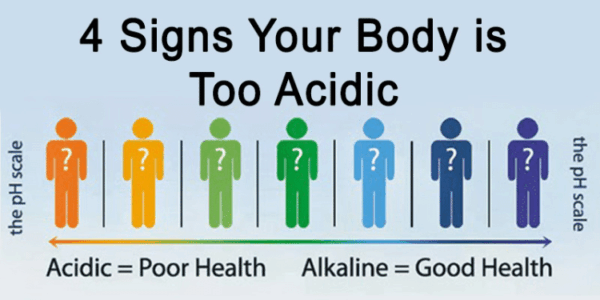Your body’s pH balance plays a crucial role in maintaining optimal health. Ideally, the human body should be slightly alkaline, with a pH of around 7.4.
However, modern diets, stress, and environmental toxins can lead to an overly acidic body, which may contribute to a range of health issues.
When the body is too acidic, it creates an environment where inflammation and disease can thrive.
In this article, we’ll look at four signs that your body might be too acidic and share practical steps to restore balance and improve your health.
1. Frequent Fatigue and Low Energy Levels
One of the first signs of an overly acidic body is chronic fatigue and a persistent lack of energy. When the body is too acidic, it needs to work harder to maintain a balanced pH level, which can drain energy and make you feel tired.
Additionally, high acidity can prevent the body from effectively absorbing essential vitamins and minerals, leading to nutrient deficiencies that further contribute to low energy levels.
How to Fix It:
- Eat Alkaline-Rich Foods: Incorporate more alkaline foods into your diet, such as leafy greens (spinach, kale), cucumbers, avocados, and broccoli. These foods help neutralize acidity and boost your energy naturally.
- Stay Hydrated: Drinking water helps flush toxins out of your system, which can reduce acidity and improve energy levels. Try adding a slice of lemon to your water, as it has an alkalizing effect once metabolized.
- Limit Acidic Foods: Cut back on acidic foods like red meat, dairy, sugar, and processed foods, which contribute to low energy levels and fatigue.
2. Frequent Illnesses and Weakened Immune System
If you find yourself catching colds frequently or struggling to recover from illnesses, your immune system may be compromised by high acidity.
An acidic environment can weaken the immune response, making it easier for viruses and bacteria to attack the body. Chronic inflammation, often triggered by acidity, also plays a role in weakening immune function.
How to Fix It:
- Add More Antioxidant-Rich Foods: Fruits like berries, citrus, and kiwi, as well as vegetables like bell peppers, help strengthen the immune system and reduce acidity.
- Include Probiotics in Your Diet: Probiotics found in fermented foods (like yogurt, kimchi, and sauerkraut) help balance gut bacteria, which can support immune function and restore pH balance.
- Reduce Stress: Chronic stress can increase acidity in the body. Practice stress-reducing activities such as meditation, yoga, or deep breathing exercises to improve your immune system and pH balance.
3. Joint and Muscle Pain
An overly acidic body can lead to inflammation, which often manifests as joint pain, stiffness, and muscle aches. When your body is acidic, it may draw minerals from bones and muscles to neutralize the acid, leaving you with aches and pains.
This can lead to symptoms similar to arthritis and other inflammatory conditions.
How to Fix It:
- Increase Your Magnesium Intake: Magnesium is a natural muscle relaxant and helps balance the body’s pH. Foods rich in magnesium include leafy greens, nuts, seeds, and whole grains.
- Avoid Processed Foods and Sugar: Processed foods and sugar are highly acidic and can increase inflammation, worsening muscle and joint pain. Choose whole, natural foods whenever possible.
- Try Alkaline-Boosting Supplements: Certain supplements, like magnesium and calcium, can help reduce acidity and relieve joint and muscle discomfort.
4. Digestive Issues (Heartburn, Acid Reflux, Bloating)
Acidity in the body can affect the digestive system, leading to symptoms such as heartburn, acid reflux, bloating, and indigestion. Excess acid can irritate the lining of the stomach and esophagus, causing discomfort and digestive issues.
How to Fix It:
- Start Your Day with Lemon Water: Though lemon is acidic in nature, it has an alkalizing effect in the body. Drinking a glass of warm lemon water in the morning can help balance your pH and improve digestion.
- Eat Smaller, Balanced Meals: Large meals can exacerbate acid reflux. Eating smaller, more frequent meals that are balanced in protein, healthy fats, and fiber can help manage acid levels.
- Reduce Caffeine and Alcohol: Both caffeine and alcohol are acidic and can irritate the digestive system. Try to limit their intake, especially if you’re prone to digestive issues.
Additional Tips for Balancing Your Body’s pH
If you’re experiencing any of these signs of acidity, here are some additional tips to help restore balance and alkalize your body:
- Incorporate Alkaline Foods into Your Diet: Foods like leafy greens, cucumbers, almonds, watermelon, and celery are highly alkaline and can help neutralize acidity.
- Avoid High-Acid Foods: Reduce your intake of meat, dairy, refined sugars, and processed foods, which can increase acidity in the body.
- Exercise Regularly: Physical activity helps flush out toxins and increase oxygen circulation, both of which support a balanced pH.
- Use pH-Balancing Herbs: Herbs like parsley, cilantro, and dandelion have alkalizing properties and can easily be added to meals for extra support.
- Consider Alkaline Water: Drinking alkaline water can be a quick and easy way to help balance your body’s pH. Many stores offer bottled alkaline water, or you can add a pinch of baking soda to water for a quick DIY version.
An overly acidic body can cause a range of uncomfortable symptoms, from low energy and frequent illness to joint pain and digestive issues.
By making small but consistent changes to your diet and lifestyle, you can help restore your body’s natural pH balance, reduce acidity, and improve your overall health.
Incorporate more alkaline foods, stay hydrated, limit processed foods, and practice stress-reducing activities to achieve a balanced, vibrant, and healthy life.

